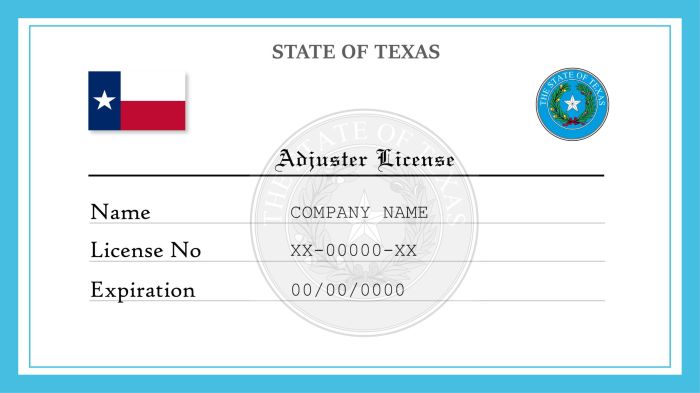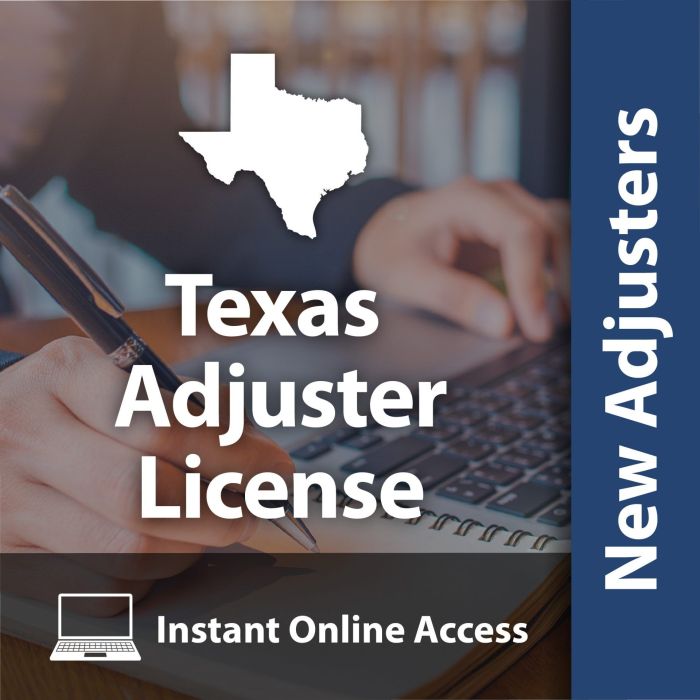Texas adjuster license exam answers – Preparing for the Texas adjuster license exam can be a daunting task, but with the right strategies and resources, you can increase your chances of success. This comprehensive guide will provide you with everything you need to know about the exam, including the content areas covered, effective study methods, and test-taking tips.
By following the advice in this guide, you can confidently tackle the exam and earn your Texas adjuster license.
Texas Adjuster License Exam Overview: Texas Adjuster License Exam Answers

The Texas adjuster license exam is a crucial step towards obtaining a license to practice as an insurance adjuster in the state of Texas. Passing this exam demonstrates your knowledge and understanding of insurance principles and practices, as well as your ability to handle insurance claims fairly and ethically.
The exam consists of 100 multiple-choice questions and must be completed within three hours. It covers a wide range of topics, including property insurance, casualty insurance, workers’ compensation, and ethics.
To be eligible to take the exam, you must meet the following requirements:
- Be at least 18 years of age
- Have a high school diploma or equivalent
- Complete a pre-licensing course approved by the Texas Department of Insurance
Once you have met the eligibility requirements, you can apply for the exam by submitting an application to the Texas Department of Insurance.
Exam Preparation Strategies
Preparing for the Texas adjuster license exam requires a comprehensive study plan and the use of effective resources.
Here are some tips for preparing for the exam:
- Start studying early and give yourself plenty of time to cover all of the material.
- Use a variety of study materials, such as textbooks, online courses, and practice tests.
- Join a study group or work with a tutor to help you stay motivated and on track.
- Take practice exams to identify your strengths and weaknesses and to get a feel for the types of questions that will be on the actual exam.
Here are some recommended study materials:
- Texas Adjuster License Exam Study Guide by Kaplan
- Texas Adjuster License Exam Prep Course by ExamFX
- Practice exams from the Texas Department of Insurance
Content Areas and Key Concepts

The Texas adjuster license exam covers a wide range of content areas, including:
- Property insurance
- Casualty insurance
- Workers’ compensation
- Ethics
Within each of these content areas, there are a number of key concepts that you need to be familiar with.
Here are some of the key concepts that you need to know for each content area:
Property insurance
- Types of property insurance policies
- Property insurance coverages
- Property insurance claims handling
Casualty insurance
- Types of casualty insurance policies
- Casualty insurance coverages
- Casualty insurance claims handling
Workers’ compensation, Texas adjuster license exam answers
- Workers’ compensation laws
- Workers’ compensation benefits
- Workers’ compensation claims handling
Ethics
- Insurance industry ethics
- Ethical responsibilities of insurance adjusters
- Legal responsibilities of insurance adjusters
Sample Questions and Practice Exercises
Here are some sample exam questions to give you a better idea of the types of questions that you can expect on the actual exam:
- What is the purpose of a homeowners insurance policy?
- What are the different types of property insurance coverages?
- How is a casualty insurance claim handled?
- What are the benefits of workers’ compensation insurance?
- What are the ethical responsibilities of an insurance adjuster?
You can also find practice exams on the Texas Department of Insurance website.
Test-Taking Tips and Strategies
Here are some tips for taking the Texas adjuster license exam:
- Arrive at the testing center early so that you have plenty of time to check in and get settled.
- Bring a calculator and a pencil or pen with you to the exam.
- Read the instructions carefully before you start the exam.
- Pace yourself so that you have enough time to answer all of the questions.
- If you are not sure about an answer, mark it for review and come back to it later.
- Don’t be afraid to guess if you don’t know the answer to a question.
- Stay calm and focused throughout the exam.
Additional Resources and Support

Here are some additional resources and support that you can use to help you prepare for the Texas adjuster license exam:
- Texas Department of Insurance website: https://www.tdi.texas.gov/
- National Association of Insurance Adjusters website: https://www.naia.org/
- Independent Insurance Agents & Brokers of America website: https://www.iiaba.net/
FAQ Section
What is the Texas adjuster license exam?
The Texas adjuster license exam is a state-administered exam that all individuals who wish to work as insurance adjusters in Texas must pass. The exam covers a wide range of topics, including insurance policies, claims handling, and legal responsibilities.
What are the eligibility requirements for the Texas adjuster license exam?
To be eligible to take the Texas adjuster license exam, you must be at least 18 years old and have a high school diploma or equivalent. You must also be a resident of Texas or have a principal place of business in Texas.
How do I prepare for the Texas adjuster license exam?
There are a number of ways to prepare for the Texas adjuster license exam. You can study on your own using textbooks and online resources, or you can take a preparatory course. There are also a number of practice exams available online that can help you assess your readiness for the exam.
What are some tips for taking the Texas adjuster license exam?
Here are a few tips for taking the Texas adjuster license exam:
- Arrive at the testing center early and be prepared to show your identification.
- Read the instructions carefully before beginning the exam.
- Manage your time wisely and don’t spend too much time on any one question.
- If you are unsure about an answer, make an educated guess.
- Don’t be afraid to ask the proctor for clarification if you need it.